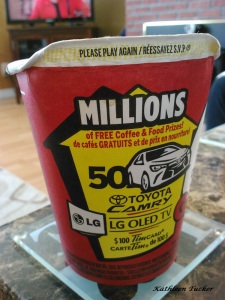As soon as I walked through the door into my in-law’s house I was lured to the stove by a mouth-watering aroma. Lifting the lid I saw diced potatoes, turnips and onions in a light broth. How could something so seemingly ordinary smell so wonderful? “What’s this?” I asked, turning to my mother-in-law. “Stewed potatoes,” she remarked.
In the six years I had lived in Newfoundland, I had never tasted stewed potatoes. If it is true that every cloud has a silver lining, I suppose the silver lining on this cloud was that my mother-in-law had cooked this pot of soup for her ailing husband, and I was invited to share the meal. Later, talking to others, I learned a meal of stewed potatoes was common years ago; quick and tasty, and enjoyed by kids and parents alike. I suspect the not-so-secret ingredient in a good pot of stewed potatoes is diced salt pork.
To cook Stewed Potatoes, dice about 1/2 cup of salt pork fat and saute in a frying pan until crisp. Add onions and saute. Add diced potatoes and turnips and just enough water to cover the vegetables. Cook until tender. Optional: when the vegetables are half-cooked, add a bit of cod and cook until tender.
Truly, it is a miser’s feast. And why a miser’s feast? Because it costs so little to make.
*****
Every St. Patrick’s Day I remember my dear old Irish granny. Peggy was Irish but grew up in Wales, and my mother always said when it came to food, my grandmother never wasted a thing. For instance, if a goose were cooked, then the goose feathers were stuffed into mattresses and pillows; the large wing pinion was used for sweeping the hearth and the smaller wing feathers for brushing flour or oatmeal while baking. No part of any butchered animal went to waste.
Looking through a Welsh cookbook on soups and savories, I was intrigued to find a recipe for Cawl: a basic dish of meat, root vegetables, potatoes, onions and cabbage. Cawl is considered to be the national dish of Wales, but here’s the interesting part; in North Wales, Cawl is also called lobscows, from the English for ‘sheep broth’. Coincidentally, the Newfoundland cookbook “Fat-back & Molasses” includes a recipe for Lob Scouce.
Just think about it. Many Newfoundland residents trace their ancestry to England, Ireland and Scotland, but here is a national dish from Wales that has made its way into kitchens on the Northern Peninsula of Newfoundland. It intrigues me that my Irish granny, raised in Wales, cooked lobscows, while someone else’s granny in Newfoundland served a similar meal called lob scouce. Fascinating stuff!
Browsing through the Welsh cookbook, I see the people of Wales made use of potatoes, onions, and bacon on a regular basis. The Miser’s Feast in their cookbook is very similar to the stewed potatoes that Len’s mother served his dad, except the Welsh used bacon rather than salt pork. the following is very simple and well worth trying.
Cover the bottom of a heavy saucepan with whole, peeled potatoes and a sliced onion. Cover with water and a little salt and pepper, place the lid on the pot and bring to a boil. Place bacon slices on top of the onion and potatoes; replace the lid and simmer slowly until the potatoes are cooked through and most of the water absorbed. Enjoy.
The Welsh, like Newfoundlanders, are very fond of onions. Their recipe for Onion Cake (so called because, for lack of a baking dish, a cake pan was used) is delicious; I’ve tried it.
You will need about two pounds of potatoes, one or two onions, salt & pepper, and one cup of beef stock. Butter the inside of a baking pan generously. Peel and thinly slice potatoes and soak them for a few minutes to draw out the starch. Drain and dry in a clean cloth. Cover the bottom of the dish with a thick layer of potatoes, then a layer of finely-chopped onions, season, and dot with butter. Continue until the dish is full, finishing with potatoes and dotting the top with extra butter. Add beef stock. Cover with foil and bake in a hot oven for about an hour, when the potatoes should be soft and cooked right through. Ten minutes before the end of cooking time remove the cover to brown and crisp the top.
*****
When March winds and blowing snow batter your home, get out the pots, pans and potatoes and have a go at something new. Taste and see; you might find a miser’s feast your family will cherish forever.






